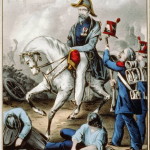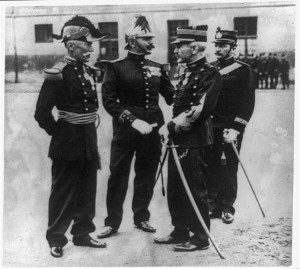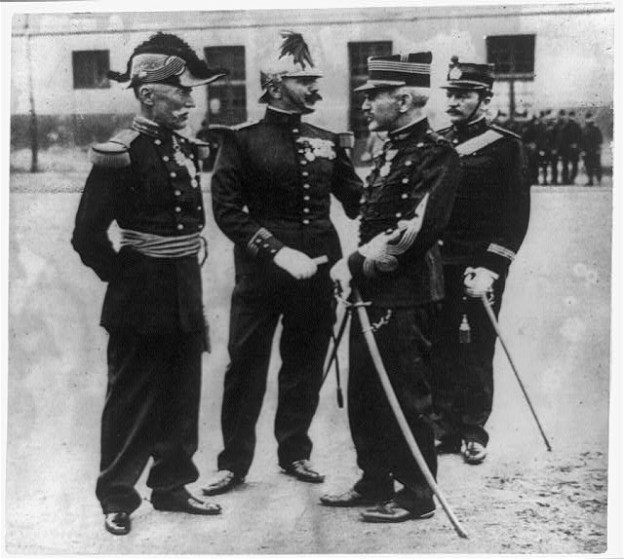So, what are the big issues in modern French History?
- Fears of change. Periphery versus the national (Paris). Modern versus traditional. New versus old forms of society, government, culture. National versus local.
- Social importance and role of individuals. Individual versus community versus monarchy.
- Vitality and virtue of French. Really comes into play during Dreyfus affair and national result indicating lowering birth-rate. Escalated through the two World Wars, and can be seen as the cause of issues with Algeria, and blossoms again in their search for vitality in nuclear power.
- Political troubles. Around eleven (11) major changes in political power from 1780-1960, contrasted with other European and world powers (USA – 1, England – 1, Germany – 5)
I’ll look at the following:
- Republicanism and Nationalism
- Antisemitism
- Colonialism
- World War I and World War II
- Post-war national identity
Referencing some of these books:
- Caroline C Ford, Creating the Nation in Provincial France: Religion and Political Identity in Brittany (Princeton, N.J: Princeton University Press, 1993).
- Christopher E Forth, The Dreyfus Affair and the Crisis of French Manhood, The Johns Hopkins University studies in historical and political science 121st ser., 2 (Baltimore: Johns Hopkins University Press, 2004).
- Sudhir Hazareesingh, From Subject to Citizen: The Second Empire and the Emergence of Modern French Democracy (Princeton, N.J: Princeton University Press, 1998).
- Gabrielle Hecht, The Radiance of France: Nuclear Power and National Identity After World War II, Inside technology (Cambridge, Mass: MIT Press, 1998).
- Alistair Horne, A Savage War of Peace: Algeria, 1954-1962 (New York: Viking Press, 1978).
- Eric Thomas Jennings, Vichy in the Tropics: Pétain’s National Revolution in Madagascar, Guadeloupe, and Indochina, 1940-1944 (Stanford, Calif: Stanford University Press, 2001).
- Maurice Larkin, France Since the Popular Front: Government and People, 1936- 1986 (Oxford: Clarendon Press, 1988).
- John McManners, Church and State in France, 1870-1914 (New York: Harper & Row, 1972).
- Philip G Nord, The Republican Moment: Struggles for Democracy in Nineteenth-Century France (Cambridge, MA: Harvard University Press, 1995).
- Robert A Nye, Crime, Madness, & Politics in Modern France: The Medical concept of National Decline (Princeton, N.J: Princeton University Press, 1984).
- The Sorrow and the Pity Chronicle of a French Town During the Occupation = La Chagrin Et La Pitie: Chronique D’une Ville Francaise Sous L’occupation (Milestone Film & Video ; [New York], 2000).
- Robert O Paxton, Vichy France: Old Guard and New Order, 1940-1944, Columbia University Press Morningside ed. (New York: Columbia University Press, 1982).
- Pamela M Pilbeam, The Constitutional Monarchy in France, 1814-48, Seminar studies in history (Harlow, England: Longman, 2000).
- David Prochaska, Making Algeria French: Colonialism in Bône, 1870-1920 (Cambridge [England]: Cambridge University Press, 1990).
- Henry Rousso, The Vichy Syndrome: History and Memory in France Since 1944 (Cambridge, Mass: Harvard University Press, 1991).
- Rebecca L Spang, The Invention of the Restaurant: Paris and Modern Gastronomic Culture (Cambridge, Mass: Harvard University Press, 2000).
- Eugen Joseph Weber, Peasants into Frenchmen: The Modernization of Rural France, 1870-1914 (London: Chatto & Windus, 1977).
- Eugen Weber, The Hollow Years: France in the 1930s, 1st ed. (New York: Norton, 1994).
Republicanism and Nationalism

French history is replete with episodes of the populace coming to terms with their political ideas about republicanism and ideals about nationalism. Throughout most of the 19th century, France waffled between a republic and an aristocratic monarchy or empire.
Comparing Weber and Ford.
National vs local, nationalism vs individualism. Weber looks at the peasants and periphery from the government’s perspective as they sought to unify France with a national identity through language, education, culture and politics. From the governments view point, the rural population was a hindrance to modernization and improvement of France. Those outside of Paris were backwards, coarse and ignorant. For Weber, 19th Century France is the struggle for national government to overcome the periphery to create nationalism and a unified France.
Ford sees things from the perspective of those in the periphery, those outside of Paris. She argues that peasants and rural France were intelligent, politically active, and interested in maintaining their current culture and language. The Catholic democratic movement seen in this century was an attempt of local areas to keep political autonomy by using the Republican ideals to help create a new France, rather than just be overpowered by the national, urban movement. Those in the periphery were an active agent in creating France, rather than a passive or resistant minority.
Phillip Nord argues that France was finally able to create a stable Republic in the last quarter of the 19th century as they built the republic upon ideals of a civic-society and a civic-culture as the government relinquished some national power in favor of local authorities. In essence, the Third Republic allowed France to create themselves instead of forming into the mold established by the politicians.
Antisemitism
Dreyfus Affair.
Hannah Arendt’s thoughts that Dreyfus Affair is important to study of antisemitism, for it shows that such thoughts and feelings were prevalent outside of Germany. Antisemitism was only one aspect of the Dreyfus Affair, the perceived decline of masculinity, anxiety about modernity, the rise of feminism, the rise in the bourgeois and the intellectual, and the increase in material wealth and leisure all played a part in making much ado about Dreyfus.

Jews were stereotyped as weak and effeminate, foreigners and traitors. To combat this stereotype the Dreyfusards portrayed Dreyfus as a Christ-like figure, being sacrificed before the populace. They appealed to examples such as Emile Zola who changed from being obese to a picture of health, as typical of Dreyfusard willpower and manliness.
It was believed by both sides that the masculinity of French men was in decline, and that it was something men could choose. This was a troubling recognition if true, for previous belief was that masculinity was a self-evident attribute of being born male, they had to come to grips with the thought that masculinity was a trait, that it was acquired by societal constraints. This could pull into question the whole foundation of gender.
Colonialism.
Colonialism in 19th century France, as in all of Europe, was a sign of power. A countries status and abilities rose with increased territory, which came with resources. In the 20th Century the political power achieved by controlling colonies was replaced by economic power which was a result of a growing world market for resources and goods.

David Prochaska writes of France’s colonization of Algeria, specifically settler colonization, in which France set out to make Algeria a French state. Algeria was unique because more non-French Europeans came to settle in Algeria, yet it retained its connection to France. As such the status of France’s relationship with Algeria greatly influenced the politics in France. When things were good in Algeria, the people were content with the government, but as conflicts arose, so did dissatisfaction with the Republic.
Eric Jennings continues the history of French colonialism into World War II by looking at three countries under Vichy control. Again, these colonies were to show the French and their Nazi captors that they retained political and world power, despite their loss and surrender to Germany. As the Vichy instilled their own version of fascism built on the cult of Petain. Not uniquely, as they foreign nation sought to build up nationalism for France, the native populations developed their own sense of nationalism until it became strong enough to overpower French indoctrination.
Such was the case as shown by Alistair Horne in Algeria after World War II. Continuing tensions between native Algerians and the European settlers lead to years of bloody conflicts resulting in the expulsion of the French noir. Initially desiring to maintain control of Algeria to further show military ability, de Gaulle eventually realized the need to cut losses in Algeria and save France from civil unrest.
WWI and WWII.
The Great wars were devastating to France for two main reasons. First, the number of men killed in each war left a devastating toll on Frances population. Second, continual defeat at the hands of the Germans crushed morale and confidence. As Eugen Weber argues, the French in interwar Europe had become ultra pacifists, doing all they could to avoid (which amounted to doing nothing to stop) another war.
During World War II French politicians led France into another tangle of actions that afflict French perceptions of themselves even to the present day. One of the largest results of World War II is how they come to terms with the Vichy involvement with the Nazis. During the reign of Charles de Gualle, the national narrative was of the true French who were the Resistance, and the anomaly of the Vichy government. Research done in the 1960s and later has shown that the French were more complacent with the Vichy than the national narrative accounted for. These new revelations have given the French a sort of mentality complex, or as Henry Rousso terms it, a Vichy syndrome. Rousso states that the French have a lasting issue with their memories of the Vichy government because the ideological conflict that was WWII still exists, along with the defeat in 1940 that left lasting scars, and the need to include the Vichy government in any account of French history. The Vichy government has become to French history as the Nazi past is to German. The atrocities of a decade seem to overpower the centuries of national diversity.
Post-war National Identity
Since the mid 19th century, it seems the French have been continually dealing with a declining confidence in their national virility and strength. One way France has found a way to regain national identity is through technology. Gabrielle Hecht shows that France sought to redeem their national identity through a competitive nuclear power program. Their ability to innovate and achieve nuclear sustainability became the new colonialism or victory in war. It showed to themselves and the world that they were independent and still a world power.



